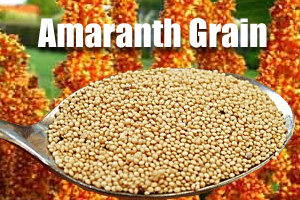Amaranth Grain – Nutritional Powerhouse A Non Gluten Alternative

Amaranth Grain Nutrition
Amaranth grain is not a grain but it is the seed produced by the amaranth plant, and it is actually a pseudo-grain or pseudo-cereal.
It is referred to as a grain like wheat, oats, and sorghum because its overall nutrient profile is similar to that of these cereal grains.
Amaranth grain has a similar nutrient makeup to true grains but it doesn’t contain gluten and therefore it is a good grain alternative for people who have celiac disease or who are sensitive to gluten.
One very special thing about amaranth grain is it contains vitamin C compared to other grains that do not. This is important because plants contain non heme iron which the body has difficulty digesting on its own.
Non heme iron is more easily absorbed when combined with vitamin C, and the combination reduces the risk of anemia in vegans and vegetarians.
Amaranth Grain Preparation
Amaranth grain is used just like other grains are used. It is prepared to be eaten like rice by adding 2 1/2 cups of water to 1 cup of amaranth. Let the amaranth grain cook for 20 minutes until it is fluffy.
You can make a porridge by adding 3 cups of water instead of 2 1/2 cups of water and let it cook for 30 minutes.
Amaranth grain is ground into a flour like wheat is and is used to make bread, cookies, and even waffles. It can be popped like popcorn by adding 2 tablespoons at a time to a very hot pot while stirring. Remove the popped amaranth right away so it doesn’t burn.
Amaranth Grain Nutrition
Values are based on 1 cup of uncooked amaranth grain:
Amaranth Grain Macronutrients
| Nutrient | Amount | %DV | |
| Calories/Energy | 716kcal | 33% | |
| Total Carbohydrates | 127g | 42% | |
| Dietary Fiber | 13g | 52% | |
| Sugars | 3g | ||
| Total Fat | 14g | 21% | |
| Monounsaturated fat | 3.3g | ||
| Polyunsaturated fat | 5.4g | ||
| Saturated fat | 2.8g | 14% | |
| Protein | 26g | ||
| Cholesterol | 0mg | 0% |
Amaranth Grain Vitamins
| Nutrient | Amount | %DV | |
| Vitamin A | 3.9IU | 0% | |
| Vitamin B1 (Thiamin) | 0.2mg | 15% | |
| Vitamin B2 (Riboflavin) | 0.4mg | 23% | |
| Vitamin B3 (Niacin) | 1.8mg | 9% | |
| Vitamin B6 | 1.1mg | 57% | |
| Vitamin B9 (Folate) | 158mcg | 40% | |
| Vitamin B12 | 0.0mcg | 0% | |
| Vitamin C | 8.1mg | 14% | |
| Vitamin D | ~ | ~ | |
| Vitamin E | 2.3mg | 11% | |
| Vitamin K | 0mcg | 0% |
Amaranth Grain Minerals
| Nutrient | Amount | %DV | |
| Calcium | 307mg | 31% | |
| Iron | 14.7mg | 82% | |
| Magnesium | 479mg | 120% | |
| Phosphorus | 1075mg | 108% | |
| Potassium | 980mg | 28% | |
| Sodium | 7.7mg | 0% | |
| Zinc | 5.5mg | 37% | |
| Copper | 1.0mg | 51% | |
| Manganese | 6.4mg | 322% | |
| Selenium | 36.1mcg | 52% |
Values based on USDA SR-26 Amaranth Grain, Uncooked, Dietary Reference Intakes (DRIs), and are given without warranty, and are not intended to replace the advice of a nutritionist or health-care professional.
Tags: amaranth grain, amaranth grain nutrition






